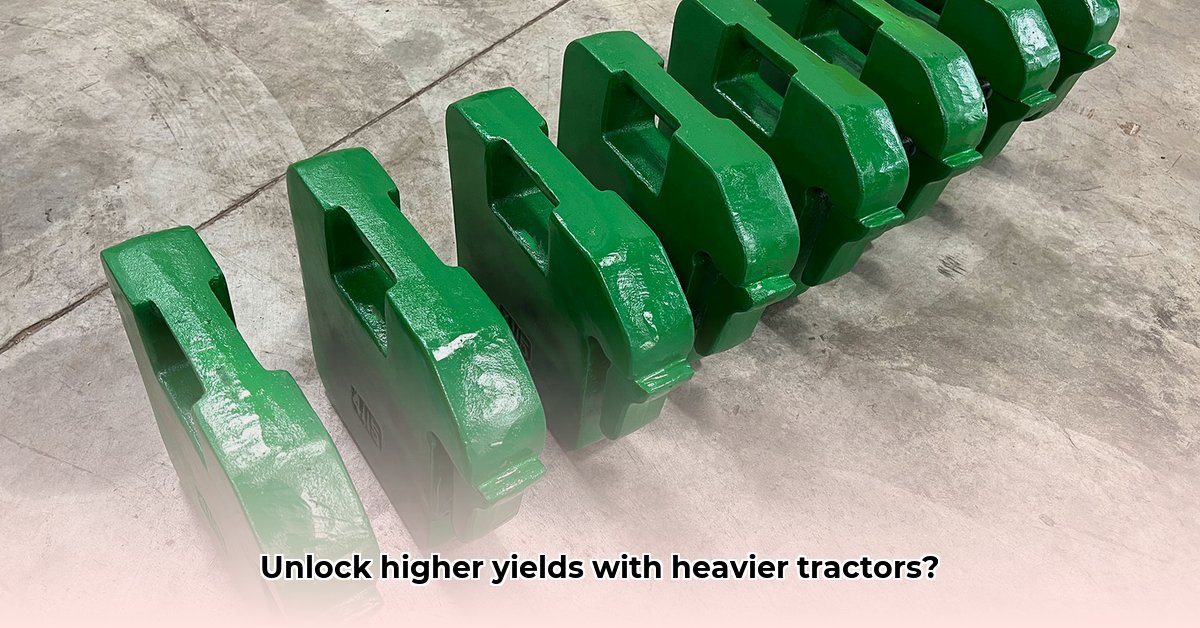
Optimizing Traction and Fuel Efficiency for a Greener Future
John Deere tractor weights, often overlooked, play a crucial role in sustainable agricultural practices. Their contribution extends beyond simply adding mass; they are key to optimizing machinery performance, directly impacting fuel efficiency and soil health. This deep dive explores how these seemingly simple additions significantly enhance the sustainability of modern farming operations.
We'll examine how increased traction translates into fuel savings, mitigating environmental impact. We'll also explore the relationship between stability and safety, highlighting the contribution of weights to efficient and safe operations. Finally, we'll delve into the synergistic relationship between tractor weights and precision agriculture technologies, showcasing their combined potential for environmental stewardship and increased profitability.
Learn more about John Deere's history here.
The Unsung Heroes of Sustainable Agriculture
The primary benefit of John Deere tractor weights is improved traction. Consider the difference between walking through mud in sandals versus sturdy boots—the boots provide the necessary grip, reducing effort and slippage. Similarly, tractor weights provide the necessary grip, minimizing slippage, particularly in challenging conditions like wet fields or steep slopes. This improved traction is paramount for efficient and sustainable farming.
"The increased traction afforded by tractor weights is fundamental to minimizing soil compaction," notes Dr. Emily Carter, Agricultural Engineer at Cornell University. "Reduced compaction leads to healthier soils that better retain nutrients, promoting biodiversity and reducing the need for excessive fertilizer inputs."
This enhanced traction directly translates to better fuel efficiency. Less slippage requires less power from the engine, resulting in significant fuel savings. This fuel efficiency isn't merely about cost; it represents a substantial reduction in your farm's carbon footprint. Every gallon of fuel saved contributes to lower greenhouse gas emissions, aligning perfectly with the growing emphasis on climate-smart agriculture. This smaller but significant step towards sustainability adds up over time, creating a measurable reduction in environmental impact.
Stability and Safety: A Foundation for Productivity
Beyond fuel savings, tractor weights profoundly impact stability, particularly on uneven terrain or inclines. Improved stability directly equates to a safer working environment, decreasing the risk of accidents and equipment damage—an essential consideration for both worker well-being and profitability.
Improved stability also leads to increased productivity. A securely planted tractor allows for faster, more efficient work, resulting in higher yields. This increased efficiency directly translates to more time spent on other crucial farm tasks, such as crop management and marketing.
"From a safety perspective, the enhanced stability provided by weights is crucial," states Mark Johnson, Farm Safety Specialist at the National Safety Council. "A more stable machine reduces the risk of rollovers and other incidents, protecting both the operator and the equipment."
Precision Farming: A Powerful Partnership
The synergy between tractor weights and precision agriculture technologies is remarkable. Precision agriculture leverages GPS-guided implements, variable rate technology, and auto-steering to optimize resource use. This targeted approach minimizes waste, directly impacting both sustainability and cost-effectiveness.
By pairing precise input application with improved traction from tractor weights, the overall efficiency of the system is greatly amplified. Less time in the field translates to more time for other essential aspects of farm management, leading to more efficient resource use and improved profitability.
Choosing the Right Weights: A Strategic Approach
Selecting appropriate weights for your John Deere tractor is crucial for optimizing performance. This entails a methodical approach, ensuring your investment yields the greatest return.
- Consult the Manual: The owner's manual provides model-specific weight recommendations, offering a starting point for your decision.
- Assess Soil Conditions: Heavier soils require more weight for optimal traction compared to lighter soils. Understanding your soil type guides appropriate weight selection.
- Consider Task Requirements: Different tasks demand different weight configurations, affecting both traction and efficiency.
- Seek Expert Advice: Consulting professionals or John Deere representatives provides valuable insights and ensures informed decisions.
The Future of Sustainable Farm Machinery
The future of sustainable agriculture hinges on continuous innovation in farm machinery. We can expect to see lighter yet powerful machines through advancements in materials science and engineering. The integration of alternative energy sources will further enhance sustainability. Smart weight management systems, dynamically adjusting weight based on real-time data, promise to further optimize fuel efficiency and precision.
Conclusion: A Holistic Approach to Sustainable Farming
Sustainable farming requires a comprehensive approach, integrating technology, best practices, efficient resource management, and environmental responsibility. By optimizing machinery performance using tractor weights and implementing precision agriculture technologies, we contribute to both environmental protection and enhanced profitability. John Deere tractor weights are a crucial, often underappreciated component of creating a sustainable future for agriculture.